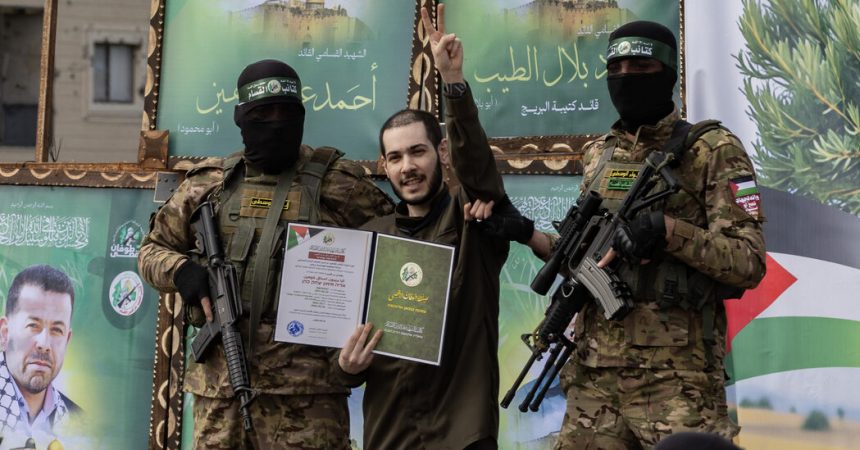Hamas released six more hostages on Saturday as part of its cease-fire deal with Israel, the last living captives to be freed under the current truce in Gaza.
As part of the cease-fire agreement, Hamas committed to releasing at least 33 of the nearly 100 captives remaining in Gaza, a number of whom are believed to be dead, in exchange for more than 1,000 Palestinians jailed by Israel and a partial Israeli withdrawal. Both sides are set to negotiate terms to extend the truce, but an agreement appears remote.
Two of the captives freed on Saturday had been in Hamas’s hands for about 10 years. Four others were taken during the Hamas-led attack on Oct. 7, 2023, which prompted the Gaza war.
Omer Wenkert
Omer Wenkert, 23, was kidnapped during the Oct. 7 assault as Palestinian militants attacked a music festival, the Tribe of Nova, being held near the Gaza border. Videos and photographs from the time of the attack show him being restrained, stripped to his underwear and surrounded by armed men in the back of a truck as he was taken away to Gaza.
He was in touch with his family on the morning of the attack and had said that he was afraid. Relatives later saw video of his abduction. His grandmother, Tsili Wenkert, a Holocaust survivor who said that she had been saved by the Soviet Army, appealed to Russian officials for help in securing her grandson’s release.
Mr. Wenkert managed a restaurant in central Israel and was supposed to start a restaurant management course in college. His father, Shai Wenkert, pleaded for his freedom near Mr. Netanyahu’s residence in Jerusalem on the first anniversary of the Hamas-led attacks.
In a speech to a group of other relatives of hostages and their supporters, he said: “A whole year in which time has stopped. I’m still on the same day.”
Eliya Cohen
Eliya Cohen, who was 27 when he was captured, had also been at the Nova music festival. He took cover with other festival attendees when militants threw grenades into their shelter and stormed it, ordering Mr. Cohen and two other men out with them, according to his girlfriend, Ziv Abud from Tel Aviv, one of the bunker’s few survivors.
Ms. Abud had gone to the festival with Mr. Cohen, her nephew and her nephew’s girlfriend. Of the four, she was the only one to make it home. Mr. Cohen was shot in the leg during the raid, she said, and she hid with him under a pile of dead bodies until she felt him pulled away from her.
Mr. Cohen’s mother, Sigalit Cohen, told The Guardian in December 2023 that she had quit her job as an accountant to lobby for the release of the captives. Near the first anniversary of the war and hostage crisis, she wrote in an editorial addressing Israelis: “Have we learned anything from that cursed day? Have we taken it upon ourselves to be better?”
Hisham al-Sayed
Hisham al-Sayed is a member of Israel’s Arab Bedouin minority from the town of Hura. He is one of two Israeli hostages, along with Hadar Goldin, who were captured by Hamas militants in the Gaza Strip many years before the Oct. 7 raids.
Mr. al-Sayed entered Gaza in 2015 and was not seen again until 2022, when Hamas released a video purporting to show him lying in a bed looking dazed and wearing an oxygen mask. Mr. al-Sayed has schizophrenia, according to his family, and had attempted to enter Gaza before. Hamas accused Mr. al-Sayed of being an Israeli soldier and was thought to be holding him to pressure Israel to release Palestinian prisoners.
In 2017, a Human Rights Watch investigation concluded that Mr. al-Sayed was not affiliated with the Israeli military or government. After Hamas captured hundreds of hostages in the Oct. 7 assault, the families of captives who had been lobbying for their relatives’ release for years joined forces with relatives of the newer hostages.
Mr. al-Sayed’s father, Shaban al-Sayed, said that the family was awaiting his son’s return with deep anxiety.
“We don’t know in what condition he’ll return,” he said. “We’re waiting for him — and when we see him, we’ll know how much we have to celebrate.”
Avera Mengistu
Mr. Mengistu, now 38, is the longest-held living Israeli hostage in Gaza. In 2014, nearly two weeks after a cease-fire ended a 50-day war between Israel and Hamas, Mr. Mengistu was seen in security camera footage walking along the beach before crossing a fence dividing Israel from Gaza.
Born in Ethiopia, Mr. Mengistu immigrated to Israel with his family when he was 5 and lived in the coastal city of Ashkelon, some 10 miles north of Gaza. His older brother told Israeli media that Mr. Mengistu had been deeply affected by the death of another sibling and faced serious mental health issues.
Mr. Mengistu was apparently last seen in a video released by Hamas in January 2023, though the footage could not be independently verified. As with Mr. al-Sayed, Human Rights Watch later assessed that he was a civilian with a history of mental health problems.
Omer Shem Tov
Omer Shem Tov was 20 when he was abducted alongside two friends at the Nova music festival. His friends — Maya Regev and her brother, Itay Regev — were released during a weeklong truce between Israel and Hamas in November 2023.
In December 2023, after their release, the Regevs appeared in a video together wearing T-shirts that bore the face of Mr. Shem Tov, pleading for his return. “Every day there is like hell,” Ms. Regev said from a wheelchair, having undergone surgeries for a gunshot wound in her leg.
“I have a friend named Omer, and I really, really miss him,” Itay said. “I know what he is going through in there, and I know how frightening it is.”
Mr. Shem Tov’s older brother, Amit Shem Tov, expressed dismay after the end of the last truce. “The end of the cease-fire is the worst thing that could have happened because it seriously delays the release of my brother,” he said.
Tal Shoham
Tal Shoham was 38 when he was captured from Kibbutz Be’eri. His wife, Adi Shoham, and their son and daughter, ages 8 and 3 at the time, were freed in the first cease-fire deal.
Early last year, Mr. Shoham’s father, Gilad Korngold, was among a group of relatives of hostages who burst into an Israeli Parliament meeting to demand action on the abductees.
“The danger is increasing every day that passes,” Mr. Korngold said in an interview afterward. “Israel and the relevant countries in the region need to sit at the table — without eating or sleeping — and make this terrible situation end.”
On the first anniversary of the attack, Mr. Shoham’s family was still waiting. His mother, Nitza Korngold, like other Israelis frustrated with the government’s lack of progress on a hostage release agreement, boycotted the official ceremony and attended an alternative commemoration.
“My dear Tal, if you can see or hear me, we all miss you so much,” she said. “We are doing everything to bring you and all the hostages home soon. We will not give up on you.”







